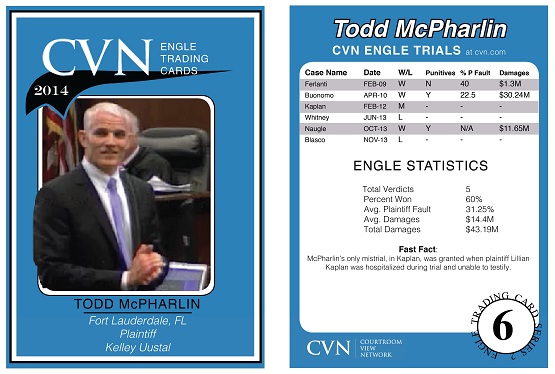Topics: Negligence, Engle Progeny, Tobacco Litigation, CVN Florida, Engle Progeny Review, News, taylor v. R.J. Reynolds, Russo v. Philip Morris
Delaware Supreme Court Rules Mistake in Termination of $1.5B J.P. Morgan Loan Stands Under UCC
Posted by Arlin Crisco on Oct 23, 2014 2:58:00 PM
The Delaware Supreme Court has found that a mistake in a UCC-3 termination statement does not invalidate the document under the state's Uniform Commercial Code. The decision, on a certified question from the United States Court of Appeals for the Second Circuit, and after oral arguments broadcast by CVN, affects a nearly $1.5 billion loan by J.P. Morgan to the former General Motors. In re Motors Liquidation Co.
Topics: UCC, CVN National, News, In Re Motors Liquidation Co.
Each Tuesday we issue a new Engle trading card featuring an attorney, trial, or firm from Florida’s Engle progeny tobacco cases. Our exclusive cards provide a light-hearted way to track important statistics throughout this landmark tobacco litigation.
Card # 6: Todd McPharlin
Topics: Engle Litigation Trading Cards, Engle Progeny, Tobacco Litigation, CVN Florida
Opening Statement of the Week: Robert Eglet in Meyer v. Health Plan of Nevada
Posted by Arlin Crisco on Oct 20, 2014 9:24:00 AM
As we highlighted last week, ensuring a jury understands a suit’s narrative is one of the key goals of a trial’s opening statement and is a critical component to building a winning case. However, when the events and relationships underlying a suit are particularly complex, as is often the case with lawsuits against insurers, breaking down the narrative into a clear, cogent storyline can be difficult. In openings of Meyer v. Health Plan of Nevada, Robert Eglet, representing plaintiffs in a suit against their HMO, combines a descriptive timeline and eye-popping details in illustrate his claim that the HMO was responsible for the insureds contracting hepatitis C.
Topics: Negligence, Insurance, Opening Statement of the Week, Trial Techniques, CVN National, Helen Meyer v. Health Plan of Nevada Inc. et al.
Each Friday we highlight the week's Engle progeny cases, examine their importance in the larger scope of the litigation, and look ahead to next week.
Topics: Negligence, Engle Progeny, Tobacco Litigation, CVN Florida, Engle Progeny Review, News, Russo v. Philip Morris






